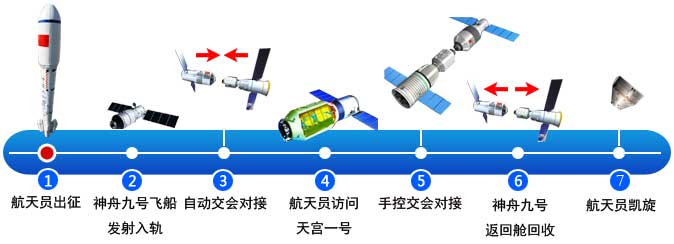频道首页 > 大事记 > 正文
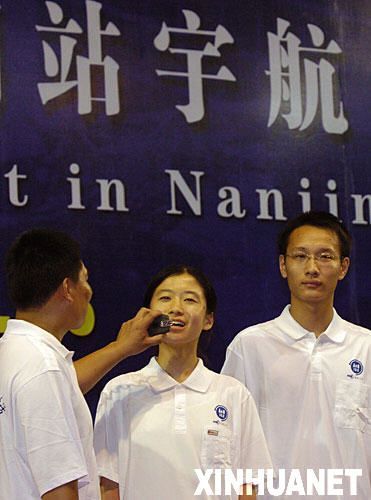
8月26日,一名学生在与宇航员对话。

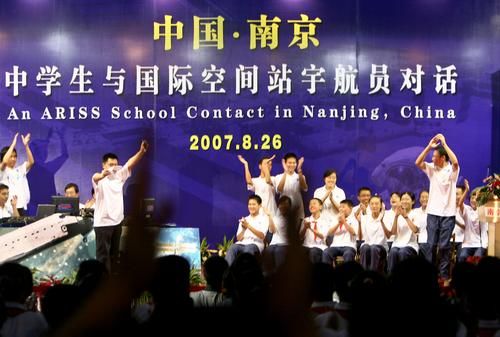
2007年8月26日18:50—19:00之间,在南京三中,中国的20名学生将与国际空间站宇航员进行通话,这是中国中学生(含港澳台地区)第一次通过学校业余电台与国际空间站宇航员实现直接通话。 通话成功后,现场一篇欢腾。
幻灯:中国学生首次与国际空间站宇航员“天地对话
新华网南京8月26日电 “你能从空间站看到中国的长城吗?”26日18时50分,南京三中学生唐洁雯通过业余无线电台,向身处国际空间站的美国宇航员克莱顿·安德森提出了问题,中国学生首次与国际空间站实现“天地对话”。
“很遗憾,目前还没有看到,但我们希望能够看到。”安德森的回答清晰地从电台中传来。
“在空间站工作会出汗吗?如果会,如何处理?”南京三中香港籍的学生尚本威郎提出了第2个问题。安德森的回答很风趣:“在空间站也会流汗,但不会往下滴,我们会用毛巾擦去。”
来自南京、上海、广州等地的20名学生按照事先约定的次序,一个挨一个提出了问题。整个通话过程持续了9分44秒,获得圆满成功。
安德森在通话中告诉中国的学生们:“国际空间站里非常安静,只能听见宇航员喝水或空气流通的声音。”“空间站产生的垃圾将由宇航员收集起来,带回地球,不会污染美丽的太空。”“空间站里有机器人帮助工作,这样可以减少宇航员的一些简单劳动,比如拿一些东西等。”
据南京三中业余电台负责人王龙老师介绍,为了这次通联对话,南京三中特别增设了一套价值10多万元的超短波通讯设备,并且购买了相应的卫星跟踪软件。在国际空间站掠过南京上空时,成功实现了对话。南京三中成为全球第311个与国际空间站实现“天地对话”的学校或团体。
由美国业余无线电联盟、国际业余卫星组织、美国国家宇航局等共同发起的“国际空间站业余无线电通讯计划”(“ARISS”)是美国国家宇航局面向青少年的科技教育项目之一。该计划要求学生用英语提出关于太空、太空飞行、宇航员的太空生活等关的问题,宇航员对学生提出的问题进行解答,要求学生有较好的英语口语和听力水平,同时对太空知识有一定的了解。
20名中国学生向宇航员提出的20个问题及美国宇航员克莱顿-安德森的回答。(资料由江苏省南京市第三高级中学提供)
1、问:Can you see the Great Wall from the ISS?
你能从空间站看到中国的长城吗?
答:I have not been able to see the Great Wall yet but I am looking for it and need to know where to look.
我现在还没看到长城,但是我正在寻找希望知道在那儿可以看到。
2、问:Do you sweat in the space and how do you handle it?
在空间站工作是否会出汗?如果有,如何处理?
答:Yes, we do sweat in space. And because there is no gravity we must use towels to wipe off the sweat.
是的,在太空我们流汗。因为没有重力所以我们必须用毛巾把汗擦去。
3、问:If air leak happens in the ISS, what emergency actions will be taken?
如果在空间站发生泄漏,你们会采取怎样的紧急措施?
答:If we have an air leak we try to isolate which module is leaking and move closer to the “Soyuz”.
如果我们有空气泄漏我们会把泄漏的部分隔绝并且向Soyuz靠的更近。
4、问:How do you handle the waste generated in the space?
你们怎样处理空间站产生的垃圾?
答:We put the waste in tanks and put those tanks onto the progress vehicle and release the progress vehicle. It burns up on the earth’s atmosphere as progress falls.
我们把垃圾放在罐子里,再把这些罐子放在俄罗斯的进步号货运飞船上,让飞船释放到太空中。当它落到地球大气层上时,它会自动燃烧。
5、问:Is it very quiet on the ISS?
国际空间站里非常安静吗?
答:No, it’s very noisy. All the fans and pumps mane so much that we need to wear ear plugs.
没有,国际空间站很吵。所有的风扇和水泵制造噪音以至于我们需要戴耳机。
6、问:What does your family think of your work in the space?
你的家人怎样看待您空间站工作?
答:Its really neat and they are very proud of me and they are happy that I can do this.
我们一家人觉得这很酷。他们为我感到自豪。他们为我能够从事这项工作而感到很高兴。
7、问:On the ISS, in which direction will the plants grow?
在国际空间站里,植物会像什么方向生长?
答:5 days ago I started growing some plant but have not seen them yet. I believe they will grow in the direction of the light.
5天前我开始种植物。但是还没有见到它们。我相信它们会随着光的方向生长。
8、问:How do you maintain oxygen supply on the ISS?
在空间站怎样获得氧气供应?
答:We get our oxygen from several places. First from tanks on the progress vehicle. Second, from tanks on the shuttle. Third, we make it through the progress of breaking down the water. Fourth, we burn oxygen candles that creates oxygen.
我们从好几个地方获得氧气:第一,从俄罗斯的进步号货运飞船的罐子里获得氧气。第二,是从航天飞机上的罐子里获得氧气。第三,我们通过分解水的过程获得氧气。第四,我们燃烧特制的扬起蜡烛获得氧气。
9、问:What does it feel like when you go through the black-out-area?
你通过“黑障区”时是怎样的感受?
答:It does not feel any different. Just wait a while and you are in contact again.
没什么区别。等一会儿你就可以再次取得联系。
10、问Is there any robot on board the ISS?
请问空间站里有机器人吗?
答:Yes, we have the robotic arm from Canada.
是的,我们拥有产于加拿大的机械手。
11、问How far does the ISS fly per hour?
空间站每小时飞行多远?
答:17500 mph or 5 miles/seconds
每小时17500英里或每秒钟5英里。
12、问:How can you keep ISS on its own orbit?
你们如何控制空间站在自己的轨道上运行?
答:ISS simply falls around the earth.
它逐渐下降,越来越靠近地球。
13、问:What if you happen to get sick?
如果你们在空间站生病会如何处理?
答:Luckily we have Dr. Oleg on board who is very good doctor.
幸运的是,我们舱内有医生Dr. Oleg,他是个非常好的医生。
14、问:What if you lost connection with the ground? Is it possible for the spacecraft to go back to the earth automatically?
如果和地面失去联系,航天飞机能否自动回到地球?
答:It is possible. If you have a very day to escape using the “Soyuz” vehicle to come back to earth.
运气不好的话有可能与地面失去联系。我们通过使用俄罗斯的联盟号飞船来回到地球。
15、问:Have you ever seen some space junk with your own eyes?
你在空间站用肉眼看到过太空垃圾吗?
答:I saw something nearby spinning around but was not sure what it was.
我曾看见附近有东西早不停的旋转。但是很小,不能确定是什么。
16、问:Does earth look any different from it used to be?
我们的地球看起来和以前有什么不同?
答:We see lots of fires burning snow but it looks the same to me.
我们看到有很多火在燃烧,也看到有云、雪和高山。但对我来说没有什么不同。
17、问:What is the longest distance between the ISS and the earth?
空间站和地球的最远距离是多远?
答:220n/miles
220海里
18、问:Which time zone do you use in the space?
空间站里使用的哪个时间?
答:GMT
格林威治时间
19、问:What do you feel about space walk (EVA)?
在太空行走的感觉是什么?
答:Cool and beautiful and I really enjoy it.
很酷,很美,我很享受太空行走。
20、问:What do the stars look like in the space?
在空间站看星星象的样子是什么?
答:The stars do not twinkle as much because there is no atmosphere, polluting. We can see them more clearly.
星星不再像地球上看来那样闪烁。因为没有大气层,没有污染,所以显得更清晰。

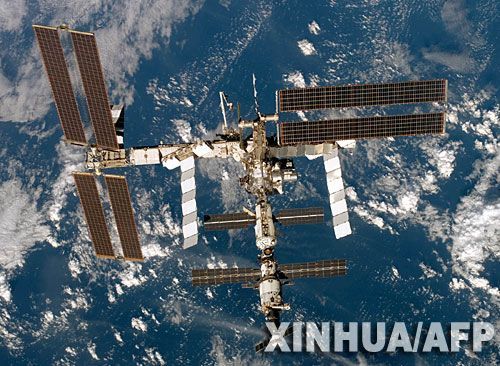
这是2006年12月19日“发现”号航天飞机在返航途中拍摄的运行在地球上空的国际空间站
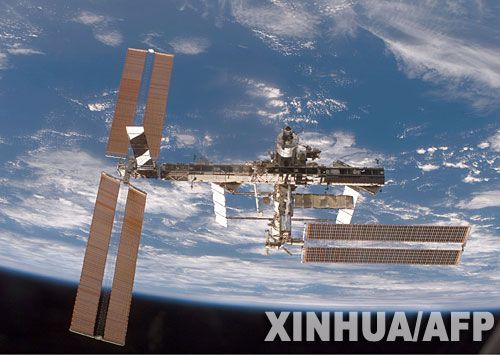
资料图片:运行在地球上空的国际空间站。
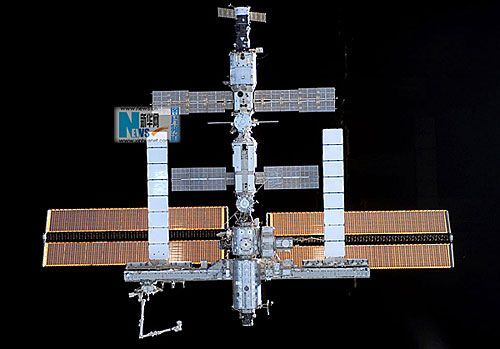

相关新闻
